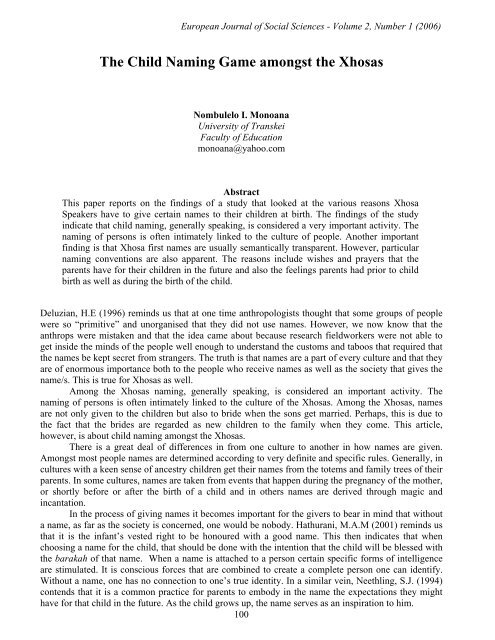EFFECT OF VITAMINS C AND E INTAKE ON BLOOD ... - EuroJournals
EFFECT OF VITAMINS C AND E INTAKE ON BLOOD ... - EuroJournals
EFFECT OF VITAMINS C AND E INTAKE ON BLOOD ... - EuroJournals
Create successful ePaper yourself
Turn your PDF publications into a flip-book with our unique Google optimized e-Paper software.
European Journal of Social Sciences - Volume 2, Number 1 (2006)<br />
The Child Naming Game amongst the Xhosas<br />
Nombulelo I. Monoana<br />
University of Transkei<br />
Faculty of Education<br />
monoana@yahoo.com<br />
Abstract<br />
This paper reports on the findings of a study that looked at the various reasons Xhosa<br />
Speakers have to give certain names to their children at birth. The findings of the study<br />
indicate that child naming, generally speaking, is considered a very important activity. The<br />
naming of persons is often intimately linked to the culture of people. Another important<br />
finding is that Xhosa first names are usually semantically transparent. However, particular<br />
naming conventions are also apparent. The reasons include wishes and prayers that the<br />
parents have for their children in the future and also the feelings parents had prior to child<br />
birth as well as during the birth of the child.<br />
Deluzian, H.E (1996) reminds us that at one time anthropologists thought that some groups of people<br />
were so “primitive” and unorganised that they did not use names. However, we now know that the<br />
anthrops were mistaken and that the idea came about because research fieldworkers were not able to<br />
get inside the minds of the people well enough to understand the customs and taboos that required that<br />
the names be kept secret from strangers. The truth is that names are a part of every culture and that they<br />
are of enormous importance both to the people who receive names as well as the society that gives the<br />
name/s. This is true for Xhosas as well.<br />
Among the Xhosas naming, generally speaking, is considered an important activity. The<br />
naming of persons is often intimately linked to the culture of the Xhosas. Among the Xhosas, names<br />
are not only given to the children but also to bride when the sons get married. Perhaps, this is due to<br />
the fact that the brides are regarded as new children to the family when they come. This article,<br />
however, is about child naming amongst the Xhosas.<br />
There is a great deal of differences in from one culture to another in how names are given.<br />
Amongst most people names are determined according to very definite and specific rules. Generally, in<br />
cultures with a keen sense of ancestry children get their names from the totems and family trees of their<br />
parents. In some cultures, names are taken from events that happen during the pregnancy of the mother,<br />
or shortly before or after the birth of a child and in others names are derived through magic and<br />
incantation.<br />
In the process of giving names it becomes important for the givers to bear in mind that without<br />
a name, as far as the society is concerned, one would be nobody. Hathurani, M.A.M (2001) reminds us<br />
that it is the infant’s vested right to be honoured with a good name. This then indicates that when<br />
choosing a name for the child, that should be done with the intention that the child will be blessed with<br />
the barakah of that name. When a name is attached to a person certain specific forms of intelligence<br />
are stimulated. It is conscious forces that are combined to create a complete person one can identify.<br />
Without a name, one has no connection to one’s true identity. In a similar vein, Neethling, S.J. (1994)<br />
contends that it is a common practice for parents to embody in the name the expectations they might<br />
have for that child in the future. As the child grows up, the name serves as an inspiration to him.<br />
100
















